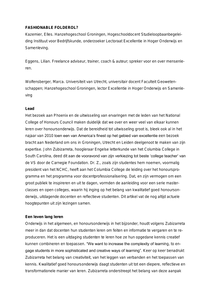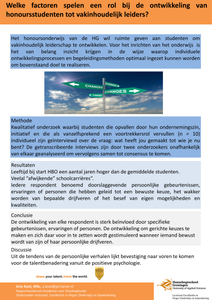Honoursonderwijs biedt niet alleen uitdagingen aan studenten, maar ook aandocenten en onderwijsonderzoekers. Onderzoek naar de leerprocessen vanhonoursstudenten, hun motivatie en betrokkenheid, hun aanpak en de begeleidingdaarbij door docenten, kunnen leiden tot nieuwe inzichten in de werking vanhet hoger onderwijs en tot nieuwe mogelijkheden en kansen voor innovatie vanhet universitair onderwijs en het hoger beroepsonderwijs.
DOCUMENT

Het hoofddoel van deze studie is het verkrijgen van inzicht in welke factoren van het honoursonderwijs een meerwaarde opleveren voor het leren van studenten in honoursprogramma’s. Deze studie draagt hiermee bij aan kennis over de relatie tussen excellentiebevorderend onderwijs enerzijds en leergedrag en motivatie van studenten anderzijds. De praktische relevantie van deze studie ligt in het ontwikkelen van kennis voor het opzetten en verbeteren van talentgericht doceren, ter bevordering van het professionaliseren van docenten. In deze studie wordt bestudeerd wat volgens docenten de meerwaarde voor studenten is van honoursonderwijs. In deze exploratieve kwalitatieve interviewstudie werden twaalf docenten in drie verschillende honoursprogramma’s voor talentvolle bachelorstudenten bevraagd over hun opvattingen. De meerwaarde van hethonoursonderwijs voor studenten wordt volgens de docenten gekenmerkt door: (1) studentgerichtheid; (2) gebruik van andersoortige onderwijsvormen; (3) nadruk op ‘inquiry-based’ strategieën; (4) gerichtheid op kritisch en creatief denken; (5) hoge verwachtingen en ambitieuze doelen; en (6) kleinschaligheid en interdisciplinair karakter. Deze resultaten worden besproken en geïllustreerd met interviewfragmenten. Tevens worden de resultaten gerelateerd aan professionalisering voor docenten in honoursprogramma’s in het hoger onderwijs.
DOCUMENT

Poster presentatie + poster award, Hanze Research Dag, 29 januari 2014 De Nederlandse overheid heeft beleid en doelstellingen geformuleerd ten aanzien van deelname aan excellentieonderwijs en het tot stand brengen van een cultuur van excellentie. Maar waarderen studenten wel de mogelijkheden die nu door onderwijsinstellingen worden georganiseerd om uit te blinken in onderwijs? In dit onderzoek wordt de vraag gesteld waar de houding van studenten ten aanzien van honoursonderwijs op gestoeld is.
DOCUMENT

Het bezoek aan Phoenix en de uitwisseling van ervaringen met de leden van het National College of Honours Council maken duidelijk dat we over en weer veel van elkaar kunnen leren over honoursonderwijs.
DOCUMENT

Posterpresentatie tijdens Onderwijs Research Dagen 2016, 25-27 mei, RotterdamHet honoursonderwijs van de Hanzehogeschool Groningen wil ruimte geven aan studenten om vakinhoudelijk leiderschap te ontwikkelen. Voor het inrichten van het onderwijs is het van belang inzicht krijgen in de wijze waarop individuele ontwikkelingsprocessen en begeleidingsmethoden optimaal ingezet kunnen worden om bovenstaand doel te realiseren.
DOCUMENT

Fundamentele maatschappelijke vraagstukken vragen om nieuwe inzichten en oplossingen. Vakinhoudelijk leiders hebben hierin een belangrijke rol. Onderwijs aan honoursonderwijs is in belangrijke mate gericht op de ontwikkeling van vakinhoudelijk leiderschap. Het doel van dit onderzoek is na te gaan wat bij studenten die zich al tijdens hun studie manifesteren als vakinhoudelijk leiders een rol heeft gespeeld bij hun ontwikkeling. Interviews met studenten worden met behulp van Atlas TI gecodeerd en geclusterd door 2 onderzoekers onafhankelijk van elkaar. Het resultaat is een overzicht van factoren die een rol spelen bij de ontwikkelprocessen van potentiële vakinhoudelijk leiders. Via dit onderzoek wordt meer inzicht verkregen in de manier hoe individuele ontwikkelingsprocessen en (honours)onderwijs verbonden kunnen worden.
DOCUMENT
Beschrijving van de workshop met als thema: Hoger onderwijs tussen bestendigingen innovatie.
LINK